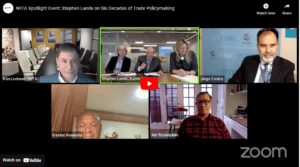On Friday, October 27, WITA hosted an event to look at the different approaches to investment restrictions currently making their way through Congress and the Administration.
Panelists discussed the Biden Administration Executive Order regarding certain US outbound investments to China in semiconductors and microelectronics, quantum information technologies, and artificial intelligence that present national security concerns. The U.S. Department of Treasury received extensive public comments to its notice of proposed rulemaking to implement the Executive Order, which is just one piece of a wide range of reforms and actions under consideration by the Administration and Congress that could restrict certain outbound investments into critical technologies.
Featured Speakers:
Daniel Bahar, Managing Director, Rock Creek Global Advisors; former Assistant U.S. Trade Representative for Services and Investment, Office of the U.S. Trade Representative
Peter Harrell, Non-Resident Fellow, Carnegie Endowment for International Peace, and former Senior Director for International Economics and Competitiveness, National Security Council at the White House
Emily Kilcrease, Senior Fellow and Director of the Energy, Economics, and Security Program, Center for a New American Security
Clete Willems, Partner, Akin and Non-resident Senior Fellow, Atlantic Council; former Deputy Assistant to the President for International Economics and Deputy NEC Director, The White House; former Chief Counsel for Negotiations, Legislation, and Administrative Law, Office of the U.S. Trade Representative
Moderator: Clay Lowery, Executive Vice President, Research and Policy, Institute of International Finance; former Assistant Secretary for International Affairs at the U.S. Treasury Department, and Director of International Finance at the National Security Council at the White House
|
On Wednesday, October 25, WITA hosted Stephen Lande, to reflect on his nearly 60 years in trade policy in a discussion with WITA Board Members, Nicole Bivens Collinson and Katrin Kuhlmann.
Steve’s career started in 1964 as a graduate assistant to the Deputy Assistant Secretary of State for Trade. Upon graduation, he joined the Foreign Service where he served in Greece and Luxembourg, as well as the Offices of General Commercial Policy and the Office of Textiles. He joined the Office of the United States Trade Representative in 1973. In his decade at USTR he served as chief bilateral trade negotiator for the United States. His work spanned the globe, including work on the Tokyo Round of the GATT, U.S. trade with Japan, Mexico, Europe, Israel, Egypt, the Gulf Cooperation Council, ASEAN, and the Americas. Steve’s most lasting contributions have been in U.S. and global trade with lesser developed countries, both in government, academia, and as founder and President of Manchester Trade.
At the end of the webinar, friends and colleagues of Steve made an appearance to share their stories of working with Steve throughout the years. Those who spoke were Jorge Castro, Director of the Legal Affairs Division of the WTO; Erastus Mwencha, Board Chair of Trademark AFRICA; and Jon Rosenbaum, former Assistant U.S. Trade Representative for Trade and Development.
Featured Speakers:
Katrin Kuhlmann, Visiting Professor of Law; Faculty Co-Director, Center on Inclusive Trade and Development, Georgetown Law; Member, Trade Advisory Committee on Africa, Office of the U.S. Trade Representative
Stephen Lande, President, Manchester Trade
|
|
A move by China that could curtail exports of graphite may throw a wrench into the supply chains of electric vehicle and battery makers that rely on highly processed versions of the mineral to help power their fleets of plug-in automobiles.
The graphite restrictions followed moves by the U.S. to curb exports of certain semiconductors American companies can sell to China. The U.S. has cited national security concerns for the stiffened export controls, just as China did for its action on graphite.
On Friday, China announced that starting in December it would require export permits for specialized forms of synthetic graphite and natural flake graphite.
China dominates the market for graphite, which is used in the anode of nearly every EV battery. The U.S. sourced roughly a third of its graphite supply from China in 2021. The country is also a major player in other rare earth minerals used in EV production, including lithium.
A Congressional Resource Service report noted last year that the U.S does not have any active graphite mines and has few prospects to develop domestic reserves.
“There’s no way that we can easily decouple ourselves from China,” said Kevin Ketels, an assistant professor of global supply chain management at Wayne State University. “That’s not going to happen.”
|
Before the COVID-19 pandemic, many supply chains strove for efficiency at all costs. While this approach lowered costs and shortened lead times, it led to significant disruption at the pandemic’s onset. Now, organizations favor adaptability and supply chain AI could be the key to achieving it.
Transitioning from a lean business model to more flexible alternatives is a substantial and challenging shift. While it can seem intimidating, new technology — namely, artificial intelligence — provides a path forward. The key lies in using it effectively.
A Global Supply Chain Problem
Supply chain AI’s value is clearer when organizations understand the scope of the problems it solves. Today’s supply chains are in dire need of change. The pandemic has revealed how these networks have too many single dependencies, are too risk-prone, and have too few fallbacks and safeties to mitigate disruption.
A staggering 83% of supply chain organizations have experienced raw material shortages within the past year. These shortages are often disruptive, too, as 45% of companies have no visibility past their first-tier suppliers. Many others rely on just one or two sources for mission-critical resources. If something happens at a single upstream supplier, companies often won’t see it coming and are stuck until the supplier can recover. In light of how frequent disruptions are today from severe weather, geopolitical conflict and worker shortages, something needs to change. Supply chains must become adaptive so they can respond quickly to prevent delays and shortages.
The Promise of AI
Businesses can arrive at adaptive supply chains through different paths. Regardless of the specifics, though, AI makes the journey easier.
Tackling Inventory Management
|
|
|





